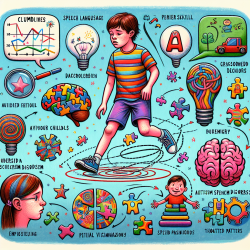Introduction
In the ever-evolving world of healthcare, the integration of information technology (IT) into medication management has been a game-changer, particularly in outpatient care settings. The research article "Task Analysis of Information Technology-Mediated Medication Management in Outpatient Care" provides a comprehensive framework that can significantly enhance the skills of practitioners, leading to improved patient outcomes. This blog will explore how the findings from this study can be applied to online therapy services, like those offered by TinyEYE, to create better outcomes for children.
Understanding the Framework
The study identifies three main components of the medication management process: reviewing the medication situation, composing a treatment plan, and accomplishing and communicating the treatment and surveillance plan. Each component involves a series of procedural, cognitive, and macrocognitive tasks. By understanding and implementing these tasks, practitioners can optimize the use of IT in their practice.
Key Findings and Their Application
- Reviewing the Medication Situation: This involves cognitive tasks such as evaluating the reliability of sources and procedural tasks like documenting current medication. For online therapy practitioners, this means ensuring that all relevant patient information is accurately recorded and easily accessible.
- Composing a Treatment Plan: This component focuses on cognitive tasks, including decision-making and shared decision-making with patients. In the context of online therapy, practitioners should collaborate with patients and their families to develop personalized treatment plans that consider the unique needs of each child.
- Accomplishing and Communicating the Treatment Plan: Effective communication is crucial in this stage. Practitioners must ensure that patients and their families understand the treatment plan and know what to expect. This is especially important in online therapy, where clear communication can bridge the gap between virtual and in-person interactions.
Encouraging Further Research
While the framework provided by the study offers a solid foundation for improving IT-mediated medication management, it is essential for practitioners to continue exploring new research and methodologies. By staying informed about the latest developments in the field, practitioners can ensure they are providing the best possible care to their patients.
Conclusion
The integration of IT into medication management presents an opportunity for online therapy practitioners to enhance their skills and improve patient outcomes. By applying the findings from the "Task Analysis of Information Technology-Mediated Medication Management in Outpatient Care" study, practitioners can optimize their use of IT and create better outcomes for children. To read the original research paper, please follow this link: Task analysis of information technology-mediated medication management in outpatient care.










